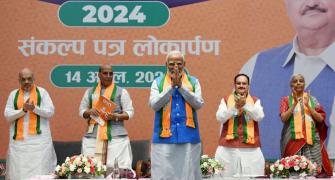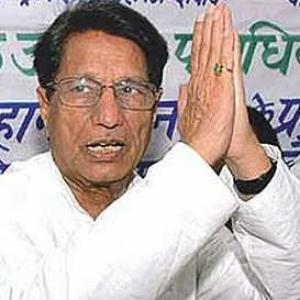Governments in India have used a clause (known in the legal trade as Section 292 of the Indian Penal Code) to curb various attempts to titillate the Indian mind, writes Ajit Balakrishnan.
 No sooner had we assembled in the conference hall at Delhi's India Habitat Centre last week than an acquaintance sitting a row away leaned towards me and whispered, "They want to throttle freedom of expression on the Internet."
No sooner had we assembled in the conference hall at Delhi's India Habitat Centre last week than an acquaintance sitting a row away leaned towards me and whispered, "They want to throttle freedom of expression on the Internet."
"Who?" I whispered back.
He gestured at the podium where sat the minister, the minister of state, the secretary and additional secretary of the ministry of communications and information technology of the government of India.
Even as I was trying to phrase my response briefly enough to be whispered back to him, the organisers called the meeting to order.
As the afternoon progressed and voices' volume kept rising, I could not help but wish that the meeting was being held not at the Indian Habitat Centre in Delhi but in the Bengal Club on Russell Street in Kolkata.
That venerable address was once the residence of Lord Babington Macaulay, who, as every Indian schoolchild knows, is the man who engineered English into being the language for India's higher education system.
What is slightly less known is that he is also the author of the Indian Penal Code, that vast compendium of dos and don'ts governing our unruly democracy -- and which, among other things, threatens to fine or imprison whoever 'sells or distributes, or imports or prints for sale or hire, or wilfully exhibits to public view, any obscene book, pamphlet, paper, drawing, painting, representation, or figure'.
Macaulay finished his masterpiece by 1837 and, bored with things in Calcutta (now Kolkata) by then, returned to London.
The East India Company officials, who were busy with other things, forgot all about Macaulay's Indian Penal Code.
Then the Indian 'Mutiny' struck.
After quelling the revolt by force, including shooting some of the mutineers from their cannon, the British found it necessary to legitimise their rule not merely through the East India Company's ad hoc rules, but through an organised body of law.
Someone dusted off Macaulay's work and enacted it in 1860, three years after the Mutiny.
From then on, governments in India have used a clause (known in the legal trade as Section 292 of the Indian Penal Code) to curb various attempts to titillate the Indian mind.
A favourite target was D H Lawrence's Lady Chatterley's Lover.
Glancing through the legal history of the early 20th century, I am struck by the fervour with which the British government clamped down on the book throughout its empire.
Independence from the British did not dampen this fervour.
In 1962, Ranjit Udeshi, otherwise a law-abiding citizen, was convicted by the Additional Chief Presidency Magistrate in Bombay of the offence of selling Lady Chatterley's Lover in his Happy Book Stall on Colaba Causeway, down the road from where I live in Mumbai.
He was asked to choose between paying a fine of Rs 20 and a week's imprisonment.
I was brought back from this reverie into the -- by now -- cacophonous meeting at the India Habitat Centre, by the protests of various Internet-related businesses that they lacked the expertise to take the call that Section 79 of the Information Technology Act requires: that if anyone objects to anything being done on their sites, the site owners have to decide whether to stop such action.
Here, again, I could not help but think how Section 79 is in fact preventing Internet site owners from the fate that befell poor Ranjit Udeshi of Happy Book Stall.
By beginning with the words, "Notwithstanding anything contained in any law in time being in force. . ." the Section had, in one stroke, cancelled the application of Macaulay's masterwork of 1837 to the Internet.
Internet businesses, including cybercafes, now stand protected because Section 79 classifies them as 'intermediaries' -- not holding them responsible for what people view and upload.
Section 79 also converted what was a 'criminal' act under Macaulay's formulation to a civil dispute between people.
Thus, for example, if the owner of the copyright of a song objects to a cybercafe visitor listening to that song from a website that is not licensed by the copyright owner, all that the cybercafe owner needs to do, for example, is tell the copyright owner within three days to approach the offending site directly.
In Macaulay's dispensation, the cybercafe owner would have been open to criminal charges.
Much of the decibel level of the meeting was generated about the rules that have been issued to implement Section 79.
As Thomas Birkland points out in his book, An Introduction to the Policy Process, Acts are passed in open Parliament in full view of lawmakers and the media, whereas rules are formulated by government officials at their offices in a less visible process.
The phrasing of rules can make or mar the intent of an Act.
Some in the meeting took a view best summarised in the evocative words of an activist website: that some aspects of the present rules are "killing the Internet softly".
Attending a meeting such as this, where powerful policy folks engage in give and take with four dozen-odd lawyers, social activists, journalists and businessmen, revives my faith in our democracy.
The arguments are vigorous and loud, and powerful policy makers are given no more respect -- or, for that matter, no less respect -- than anyone else in the room.







